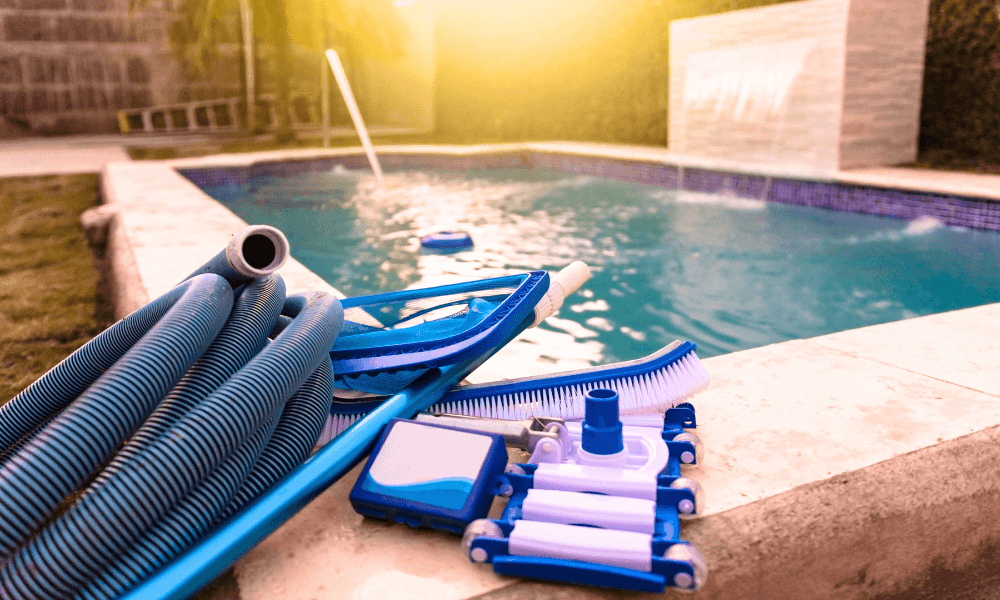Owning a swimming pool provides endless enjoyment, but keeping it in top condition requires year-round care. Each season brings different challenges, from heavy summer use to winter preparation. A proper pool maintenance routine ensures clean water, efficient equipment, and a longer lifespan for the pool.
Many pool owners focus primarily on summer care, but maintaining a pool throughout the year prevents costly repairs and extends its longevity. Seasonal upkeep keeps water balanced, reduces debris buildup, and ensures that the filtration system operates efficiently. This article outlines essential pool maintenance tips for every season, helping homeowners keep their pools in pristine condition all year long.
1. Spring Pool Preparation: Getting Ready for the Season
As temperatures rise, pool owners should focus on opening their pools correctly to ensure clean, safe swimming conditions.
Key Spring Maintenance Tasks:
- Remove and Store the Pool Cover: Clean and dry the cover before storing it to prevent mold growth.
- Check Water Levels: Fill the pool to the appropriate level before running the pump.
- Inspect Pool Equipment: Ensure pumps, filters, and heaters are functioning properly.
- Shock the Pool: Adding a shock treatment kills bacteria and restores water clarity.
- Test and Balance Chemicals: Adjust pH, chlorine, and alkalinity levels before swimming.
Proper spring maintenance prevents algae growth and ensures that the pool is ready for summer use.
2. Summer Pool Care: Keeping Up with High Usage
Summer is the most demanding season for pool maintenance. Frequent use, higher temperatures, and increased exposure to sunlight can lead to water chemistry imbalances, algae growth, and debris buildup.
Essential Summer Pool Maintenance Tips:
- Maintain Proper Chlorine Levels: Sunlight depletes chlorine faster, requiring more frequent adjustments.
- Run the Pool Pump Regularly: Circulating water for at least 8-12 hours a day prevents stagnation.
- Clean Filters Weekly: Remove debris and rinse filters to maintain proper water flow.
- Brush and Vacuum the Pool: Regularly cleaning the walls and floor prevents algae growth.
- Monitor Water Evaporation: Refill as needed and maintain proper water levels to keep the filtration system running efficiently.
Consistent upkeep ensures the pool remains clear and inviting throughout the season.
3. Fall Pool Maintenance: Preparing for Cooler Weather
As temperatures drop, pool use often decreases, but maintenance remains important. Proper care during the fall prevents leaves, dirt, and other debris from causing long-term damage.
How to Maintain a Pool During Fall:
- Skim and Remove Leaves Daily: Excess debris can clog filters and stain pool surfaces.
- Adjust Chemical Levels: Cooler temperatures slow down chlorine consumption, requiring fewer adjustments.
- Clean and Inspect Pool Equipment: Prevent dirt buildup that could cause wear and tear.
- Reduce Filtration Run Time: With lower temperatures, running the pump 4-6 hours a day is often sufficient.
- Consider a Pool Cover: If the pool will not be in use, covering it reduces maintenance needs.
Taking these steps in the fall helps reduce the workload when closing the pool for winter.
4. Winterizing the Pool: Protecting It During the Off-Season
For pool owners in colder climates, winterizing the pool is essential to prevent freezing damage. Proper closing techniques protect pipes, pumps, and surfaces from costly repairs.
Steps for Winter Pool Maintenance:
- Balance Water Chemistry Before Closing: Proper pH and alkalinity levels prevent staining and corrosion.
- Lower the Water Level (if necessary): Prevents overflow and reduces the risk of freeze damage.
- Drain Pool Equipment: Remove water from pumps, filters, and heaters to prevent cracking.
- Add a Winterizing Chemical Kit: Helps keep water clear and prevents algae growth during the off-season.
- Cover the Pool Securely: A quality pool cover protects against debris and harsh weather conditions.
By following a winterizing routine, homeowners ensure that their pool remains in good condition until spring.
5. Year-Round Pool Water Chemistry Management
Regardless of the season, maintaining balanced water chemistry is one of the most important aspects of pool maintenance. Unbalanced water can lead to algae growth, cloudy water, and damage to pool surfaces and equipment.
How to Keep Pool Water Balanced:
- Monitor pH Levels: Keep pH between 7.2 and 7.6 to prevent skin irritation and equipment corrosion.
- Maintain Proper Chlorine Levels: Helps disinfect the water and keep it free of harmful bacteria.
- Adjust Alkalinity and Calcium Hardness: Prevents scaling on pool surfaces and equipment.
- Shock the Pool as Needed: Helps clear cloudy water and remove contaminants.
Routine chemical testing and adjustments keep the pool water safe and enjoyable.
6. Cleaning and Maintaining Pool Equipment
Pool pumps, filters, and skimmers work hard to keep water clean, but they need regular care to function efficiently.
How to Maintain Pool Equipment:
- Backwash the Filter: Removes built-up debris and keeps filtration effective.
- Check Pump Performance: Ensure the pump is running smoothly and without leaks.
- Inspect Pool Lights: Replace bulbs and check wiring for safety.
- Clean Pool Skimmers and Baskets: Prevents clogs and improves water circulation.
Regular maintenance extends the lifespan of pool equipment and prevents costly repairs.
7. The Importance of Regular Pool Cleaning
Even with balanced chemicals and working equipment, debris can accumulate and affect water quality.
Best Practices for Routine Cleaning:
- Skim the Pool Daily: Removes leaves, bugs, and dirt before they sink.
- Vacuum the Pool Weekly: Prevents debris buildup on the floor.
- Brush Pool Walls and Tiles: Prevents algae and scale formation.
A clean pool not only looks better but also functions more efficiently.
8. Detecting and Fixing Pool Leaks Early
Leaks can lead to significant water loss and structural damage if left unnoticed.
Signs of a Pool Leak:
- Unexplained Water Loss: If the water level drops faster than normal evaporation.
- Wet Spots Around the Pool Area: Indicating possible underground leaks.
- Higher Water Bills: An unexpected increase in water usage may point to a leak.
Early detection prevents excessive water waste and costly repairs.
9. Scheduling Professional Pool Service for Optimal Maintenance
While some pool tasks can be handled by homeowners, professional maintenance ensures the pool remains in peak condition year-round.
Benefits of Professional Pool Maintenance:
- Expert chemical balancing for water clarity and safety.
- Advanced equipment inspections and cleaning.
- Time-saving convenience for busy homeowners.
Encore Pool Care provides professional pool maintenance services that help homeowners keep their pools clean, safe, and well-maintained in every season.
10. Conclusion
Year-round pool maintenance is essential for preserving water quality, preventing damage, and ensuring a safe swimming environment. By following seasonal care routines, balancing water chemistry, and keeping equipment in top shape, homeowners can extend the life of their pools and reduce maintenance costs.
For those seeking professional assistance, Encore Pool Care offers expert pool maintenance services tailored to seasonal needs. With proper care and routine maintenance, pools remain clean, safe, and ready for enjoyment throughout the year.
Read more from business news



































